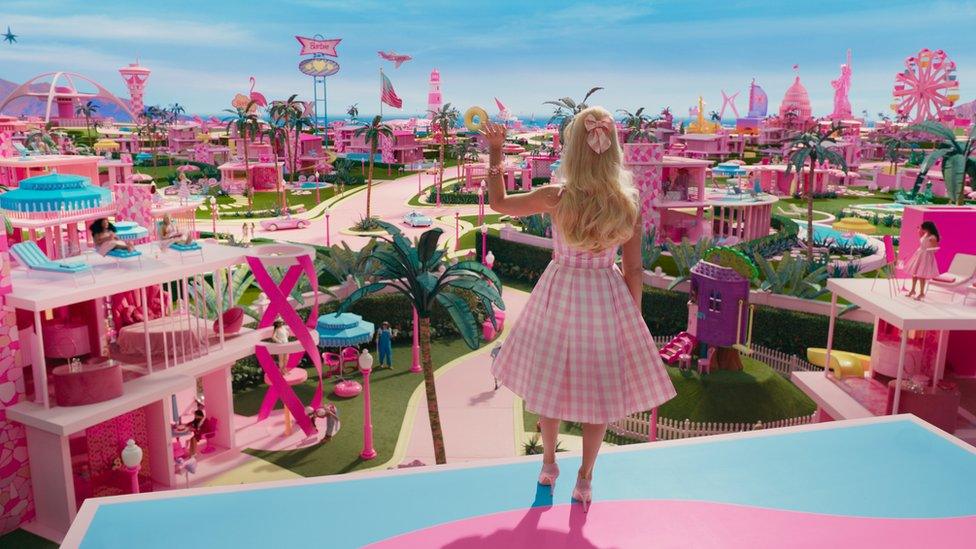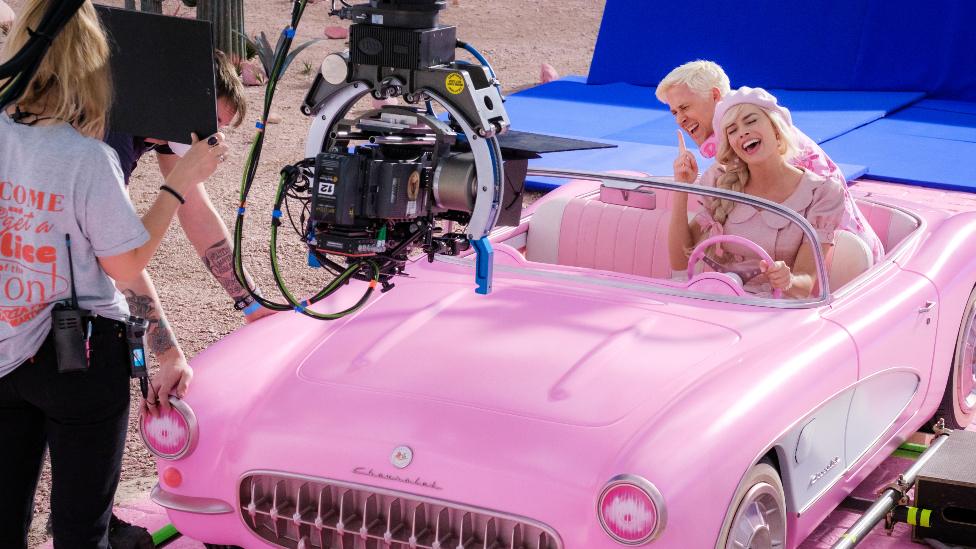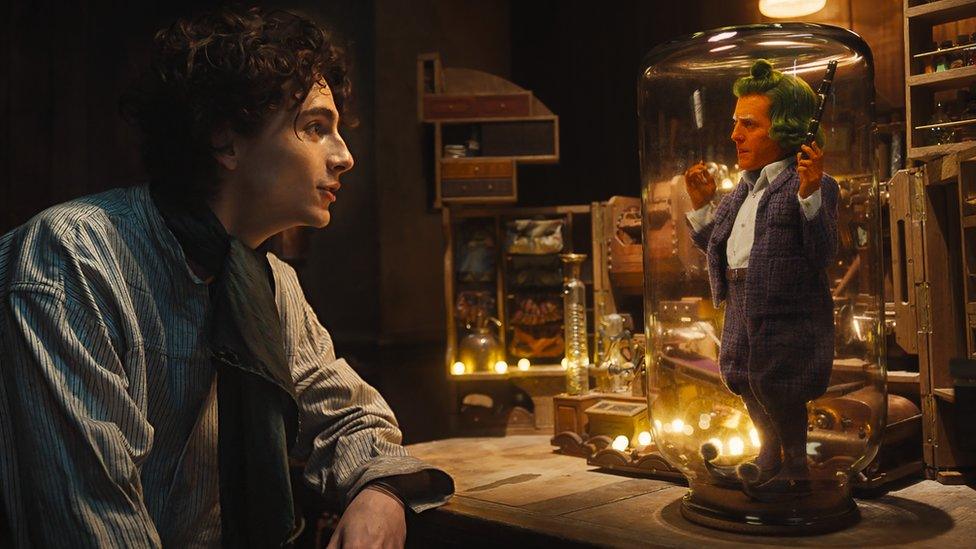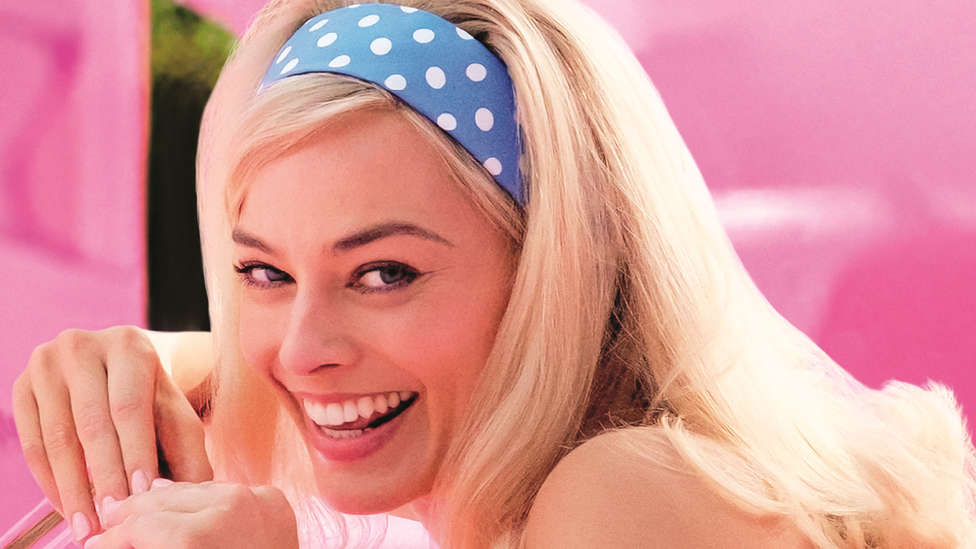Barbie movie added £80m to UK economy and used 6,000 extras, Warner Bros says
- Published

California? Think again - the Barbieland set was built in Hertfordshire
Hit movie Barbie contributed more than £80m to the UK economy during filming, according to Warner Bros.
The studio said the production created 685 jobs, employed over 6,000 extras, supported 754 local businesses and paid more than £40m in local wages.
Directed by Greta Gerwig, the film was largely shot at the Warner Bros studios in Leavesden, Hertfordshire.
The movie has since generated £95m in UK box office revenues, Warner added in evidence to a Parliamentary committee.
While Barbieland was designed to look like a toytown California, sets such as Barbie's Dreamhouse were built and filmed in the UK studio.

Barbie is the top film of 2023, making more than $1.4bn at box offices around the world
Other movies to have been filmed at the Leavesden studio include the Harry Potter franchise, The Batman and Aquaman.
The 200-acre site just north of London has also been used to film the forthcoming Wonka, inspired by Roald Dahl's Charlie & The Chocolate Factory and starring Timothée Chalamet.
In its submission to the Culture, Media and Sport committee's inquiry into British film and high-end television, Warner Bros Discovery said the UK is the company's largest base outside the US, with over 4,000 permanent staff.
It has announced a major expansion of its studio, which would increase capacity by more than 50% and create another 4,000 jobs.

Timothée Chalamet plays Willy Wonka, while Hugh Grant features as an Oompa-Loompa
The expanded complex will become the hub for future films in the DC Studios stable - the home of Superman, Batman and Wonder Woman - it added.
In other evidence to the inquiry, Pinewood Studios in Buckinghamshire said the UK is the world's most popular location for filming.
It said 23% of international feature film and high-end television productions in 2022 were based in the UK, ahead of California on 21%.
Pinewood said the success "reflects the opinion of the major global content makers that the UK is the best and the first-choice production market in the world".
UK success 'under threat'
However, Amazon warned that studio space in the UK is "close to capacity", while James Corden's production company Fulwell 73 told the committee that capacity problems "threaten the UK's continued success".
The company, which is building a new studio complex in Sunderland, added: "Existing studios are fully booked, and crew shortages impact the quality and profitability of productions. Evidence suggests the UK is losing productions because of these constraints."
The Motion Picture Association highlighted "intense competition" from other countries, warning that the UK faces "serious skills gaps" and that a planned overhaul of tax breaks must not damage the country's appeal.
While the UK is a popular destination for Hollywood producers, concerns were also raised about the decline of independent British film-making and distribution, with the British Film Institute saying the industry faces "an existential crisis".
It said factors including cost inflation, competition for crew, reduction in public funding and less appetite for risk among investors were making it "extremely hard to finance and distribute UK independent films both domestically and globally".
Meanwhile on Wednesday, Pathe announced it is to close its UK theatrical film distribution business and instead focus on TV series.
Pathe UK's films have included The Queen, Girl With A Pearl Earring, The Iron Lady, Suffragette, Selma and most recently The Great Escaper, starring Michael Caine and Glenda Jackson. Pathe's English-language films will be co-ordinated by its Paris headquarters.
In its evidence to the committee inquiry, the Department for Digital, Culture, Media and Sport said it "recognises the current challenges facing the industry, and acknowledges that more can be done to empower the industry to thrive", adding that it would maintain "a strong and globally competitive sector".
Related topics
- Published9 October 2023

- Published22 September 2023

- Published24 July 2023
